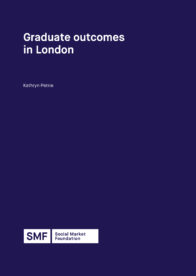Much of the discussion related to higher education policy often focuses on widening access and participation for underrepresented groups. However, very little is known about the extent to which outcomes vary by student characteristic. This research, supported by the Greater London Authority, seeks to fill the evidence gap and focuses on how the outcomes of graduates who have studied in London and those from London vary by a range of different characteristics.
Using data from the Higher Education Statistics Agency (HESA), the analysis evaluates four key outcomes (degree classification, employment status, full-time earnings and occupation) for different groups of graduates six months after leaving university.
The graduates within the analysis are split into three categories based on their domicile prior to university and study location: Londoners in London, Londoners elsewhere, and non-Londoners studying in London. These are then segmented by characteristics including gender, ethnicity and socio-economic status.
The findings indicate that there are clear differences in degree attainment by ethnicity, socio-economic status and entry qualification which are not explained by other variables in the analysis. The government and the higher education sector should therefore consider increasing focus on improving and understanding graduate outcomes across characteristics.


